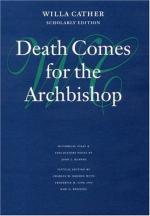|
This section contains 957 words (approx. 4 pages at 300 words per page) |

|
SOURCE: “The Pathos of Distance,” in The Nation 125, No. 3249 (12 October 1927): 390.
In the following essay, Krutch discusses Death Comes for the Archbishop as an elegy and compares the novel, which, he points out, has almost no plot, to a beautiful picture.
In one of his literary essays Havelock Ellis drew a useful distinction between what he called the Nordic and the Celtic treatments of the past. The uninstructed reader of Homer might, he pointed out, very reasonably suppose that the poet was contemporary with the events which he described, whereas in the case of any Celtic epic it is always perfectly evident that the author is dealing with things which, for him as well as for the reader, are remotely picturesque. The Greeks, in other words, preferred to treat the past as though it were present because they were interested in a dramatic immediacy, but the Celts deliberately evoked...
|
This section contains 957 words (approx. 4 pages at 300 words per page) |

|


